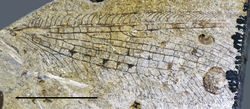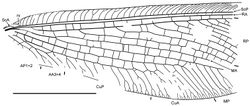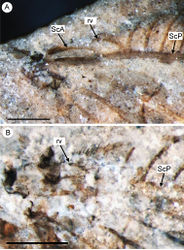Daonymphes bisulca
| Notice: | This page is derived from the original publication listed below, whose author(s) should always be credited. Further contributors may edit and improve the content of this page and, consequently, need to be credited as well (see page history). Any assessment of factual correctness requires a careful review of the original article as well as of subsequent contributions.
If you are uncertain whether your planned contribution is correct or not, we suggest that you use the associated discussion page instead of editing the page directly. This page should be cited as follows (rationale):
Citation formats to copy and paste
BibTeX: @article{Makarkin2013ZooKeys325, RIS/ Endnote: TY - JOUR Wikipedia/ Citizendium: <ref name="Makarkin2013ZooKeys325">{{Citation See also the citation download page at the journal. |
Ordo: Neuroptera
Familia: Nymphidae
Genus: Daonymphes
Name
Daonymphes bisulca Makarkin & Yang & Shi & Ren, 2013 sp. n. – Wikispecies link – ZooBank link – Pensoft Profile
Diagnosis
As for the genus.
Description
Forewing 29 mm long as preserved (estimated complete length about 40 mm), 11.5 mm wide. Costal space relatively broad for entire length, narrowed basally. Humeral veinlet recurrent, with one short branch. Subcostal veinlets somewhat curved, mostly forked once or twice, shallowly, few deeply; several proximal veinlets simple. ScA well developed, terminating on ScP within humeral area. Subcostal space narrow, with several scarce crossveins. RA space relatively narrow, slightly narrowed towards wing apex, with relatively numerous crossveins. RP with nine preserved branches, becoming more closely spaced towards wing apex. Crossveins rather numerous over entire radial space, irregularly spaced. M forked distal of origin of RP. MA incomplete, simple for entire preserved length. MP distally pectinate, with six preserved branches, most of these forked once or twice; no crossveins detected between branches. Cu divided into CuA, CuP rather far from wing base. CuA distally pectinate, with six preserved branches, all forked once or twice; one series of crossveins between branches of CuA, continued CuP (‘pseudo-CuP’). CuP long, strongly pectinately branched with nine long branches; of four proximal-most branches, two forked; all distal branches dichotomously forked; no crossveins detected. Eleven crossveins between CuA, CuP rather irregularly spaced. AA3+4 and its posterior branch deeply forked. Basal crossvein between CuP, AA3+4 very short; distal crossvein strongly oblique. AP1+2 deeply forked. AP3+4 not preserved. Membrane around one crossvein between MA, MP near MP and three crossveins between CuA, CuP near CuA broadly heavily shaded; most crossveins between RA, RP apparently broadly shaded, pale fuscous.
Material
Holotype CNU-NEU-NN2011119, deposited in CNUB; an incomplete forewing.
Type locality and horizon
Daohugou Village, Shantou Township, Ningcheng County, Inner Mongolia, China. Jiulongshan Formation, Middle Jurassic.
Etymology
From the Latin bisulcus,-a,-um, forked, divided into two parts, in reference to its forked subcostal veinlets.
Original Description
- Makarkin, V; Yang, Q; Shi, C; Ren, D; 2013: The presence of the recurrent veinlet in the Middle Jurassic Nymphidae (Neuroptera): a unique character condition in Myrmeleontoidea ZooKeys, 325: 1-20. doi
Images
|


